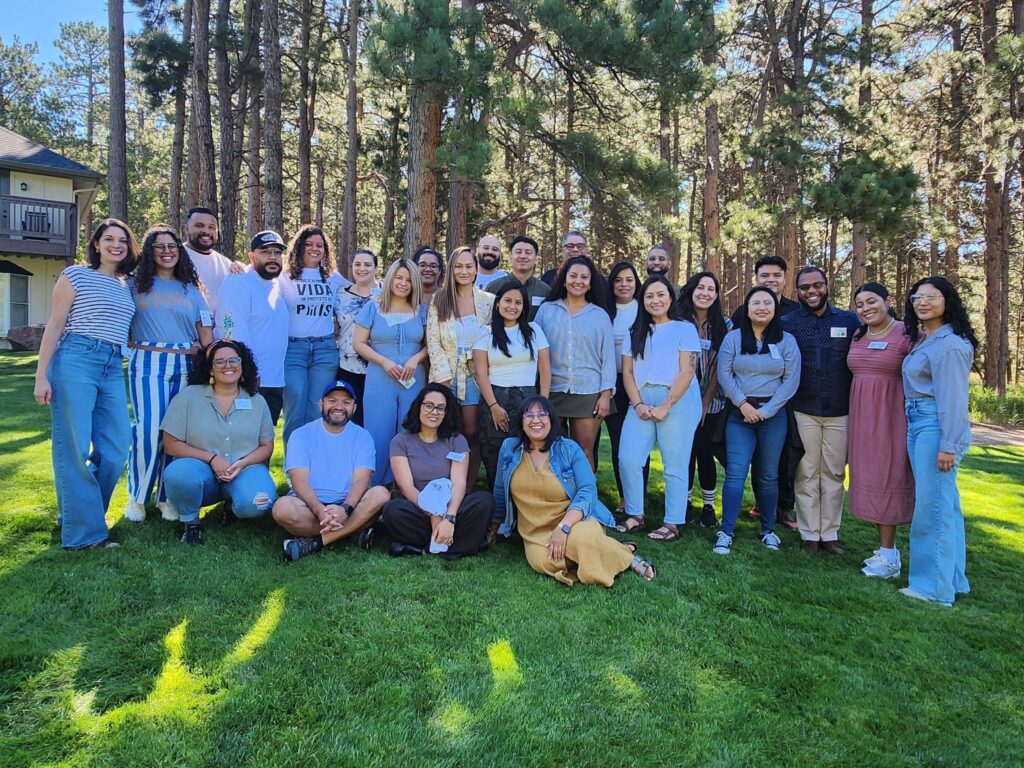Disrupting Philanthropy: How Latine Leaders are Redefining Power and Purpose
On a beautiful August afternoon in Colorado Springs, CO, a sunlit room is filled with passion and purpose. Our annual gathering of Latine nonprofit and philanthropic leaders, known as the Líderes fellowship, has come together, their voices brimming with urgency and resolve. They are a fiery group, united not just by their shared heritage, but also by their collective determination to dismantle the systems of oppression that have long kept their communities on the margins. These leaders are ready to disrupt philanthropy, redefining who holds power and what it means to lead.
The atmosphere is electric. Each person here is not just a participant in a program but a champion in a larger struggle for equity. Led by the brilliant minds of Caribana Coop, a facilitation group from Puerto Rico, the discussions are infused with a deep awareness of what’s at stake, not just for their careers, but for the future of Latine communities. For too long, the boardrooms and decision-making spaces in philanthropy have been bereft of Latine voices, with only a handful of senior executives reflecting the diversity and richness of their community. But this group is here to change that narrative.
Each cohort of the Líderes fellowship is curated to bring together professionals who are diverse in their expertise and experiences to connect in their shared vision of the future of philanthropy. Through their journey, they cultivate a deep understanding of racial healing—recognizing that personal and collective transformation must begin from within. The safe environment fostered through the program allows them to grow professionally and personally, building a foundation of trust, vulnerability, and accountability. In this gathering, that energy radiates; they are unafraid to confront the difficult truths about philanthropy's complicity in maintaining systems of inequality.
In small circles and larger conversations, they share strategies for navigating the power structures that too often hinder progress. The Líderes have been trained to analyze systems on both the micro and macro levels, and now they are putting that training to use. Conversations go beyond personal achievements and focus on how to leverage their collective agency to shift the field. Their focus is on disrupting the status quo—not just through words, but through tangible actions that challenge the norms of who gets funded, what initiatives are prioritized, and how resources are allocated.

As they speak, a clear theme emerges: equity is not an end goal; it is a daily practice. Many share stories of the challenges they’ve encountered. They talk about who gets to be Latine enough, language barriers, implicit bias, outright discrimination, or the fatigue of constantly proving their worth in a sector that often renders them invisible. But here, in this room, they are visible. They are seen, heard, and celebrated for their brilliance, resilience, and passion. We remind them that we don't care what their title is, who their parents are or aren't, or where they went to school. We care that they have shown up and are ready for the road ahead.
The bonds they are making with one another are more than professional connections; they are alliances born out of shared struggle and a mutual commitment to liberation. These relationships, built through the Líderes fellowship, are a vital part of their journey. Each leader knows they are not alone in this fight; they have a network of peers across the country who are ready to support, uplift, and challenge them when needed. Together, they are building something far more powerful than any one of them could achieve alone.
In this gathering, there is also a deep sense of care. The program has taught them the importance of tending to their physical, mental, and spiritual health, recognizing that the work of dismantling systems of oppression is taxing in ways that go beyond the professional realm. They discuss the need to care for themselves and each other—because the fight for justice is long, and they must sustain their energy throughout each chapter.
As the day draws to a close, the room is not quieting down but buzzing with possibility. These leaders are not content with incremental change; they are ready to push the boundaries of what philanthropy can be. They are leaving this gathering not just with ideas but with concrete plans for action, determined to reshape the field in ways that are more inclusive, just, and reflective of the communities they serve.
Each year, I have the privilege to be a part of the team that leads and witnesses the opening retreat gathering that sets the tone for how our cohorts approach the rest of the fellowship. Without a doubt, it’s this sacred time spent in person that ignites a spark within them. By the end of just the first day that spark has become a flame. They are ready to make their mark—not just as Latine professionals in philanthropy, but as agents of systemic change. The road ahead may be long, but they are walking it together, undeterred, knowing that they are part of something far larger than themselves. For them, it is the beginning of a new era in philanthropy, and they are leading the charge.
